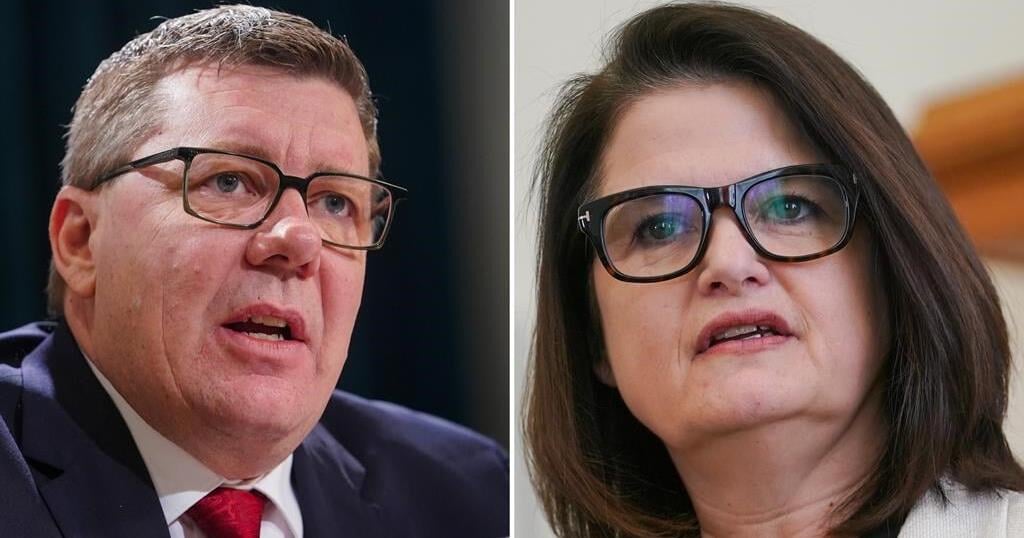REGINA – Saskatchewan Party Leader Scott Moe kicked off the provincial election Tuesday, promising broad-based tax relief to help residents battle the rising cost of living.
Moe told cheering supporters in Saskatoon that, if re-elected on Oct. 28, his government would launch a four-year plan to reduce personal income tax rates across the board.
He said given those rates are already adjusted for inflation, a family of four is set to save more than $3,400 over four years.
“It’s the largest income tax reduction since 2008,” Moe said to cheers and shouts of “well done!”
Carla Beck’s Opposition NDP, in the run up to the campaign, promised to suspend the 15-cents-a-litre gas tax for six months and scrap the provincial sales tax from children’s clothes and ready-to-eat grocery items, while not raising other taxes.
She has said the gas tax suspension would save families $350 over six months.
Moe ridiculed those changes as narrow and capricious.
“(Our plan) is significantly more than any temporary gas tax reduction that the NDP (is promising),” Moe said.
“It’s not temporary. It will remain in place, saving each and every Saskatchewan person money each and every year.”
Moe also promised a fully costed platform would be coming in the days ahead and challenged the NDP to explain how it would pay for its promises.
Beck was to launch her campaign later Tuesday in Regina.
Earlier in the day, Moe met with Lt.-Gov. Russ Mirasty to dissolve the house and issue writs directing the election.
The four-week campaign is expected to focus on the cost of living, the economy, health care and education.
Moe, who took over as premier in 2018, is seeking his second mandate in the top job.
He is expected to rally support around his government’s record on growing the economy, creating jobs and increasing the population.
Moe, representing Rosthern-Shellbrook, has also said his government’s decision to not pay the federal carbon levy on home heating has saved people money.
Beck has been the NDP’s legislature member for Regina Lakeview since 2016 and is running for the first time as the party’s leader.
Recent polls suggest a tight race between the two parties, but the breakdown on constituencies means an uphill fight for the NDP.
Polls indicate the New Democrats are stronger in the cities and the Saskatchewan Party is dominant in the rural areas. To win a majority in the 61-seat legislature, the NDP would need to sweep the 28 seats in the three largest cities – Saskatoon, Regina and Prince Albert – and hope for help elsewhere.
Moe has warned voters that an NDP government under Beck would return Saskatchewan to the days of hospital and school closures, people leaving for other provinces and a stagnant economy.
The NDP last governed in Saskatchewan from 1991 to 2007. It made cuts after the former Progressive Conservative government nearly bankrupted the province.
Moe took over as leader of the Saskatchewan Party in 2018 after former premier Brad Wall retired. Moe won his first mandate in the 2020 election during the COVID-19 pandemic and has feuded with Prime Minister Justin Trudeau’s Liberals over the carbon levy and natural resource policies.
His pre-election budget forecasted a $354-million deficit with more spending on education and health care.
Beck has said Moe mismanaged the province’s finances while failing to appropriately fund health care and education.
She has also pointed to recent problems in the Saskatchewan Party caucus — including criminal charges, retirements and rebuffs — that reduced it from 48 to 42 members at dissolution. Sixteen of those members are not running again, including eight who served in Moe’s cabinet over the last four years.
The NDP had 14 members at dissolution. There were four Independents and one vacancy.
Recent Saskatchewan Party caucus turmoil has seen members turning on one another.
In the spring, Speaker Randy Weekes accused the governing caucus of bullying. He accused Jeremy Harrison, the trade and export development minister, of taking a gun into the legislature in 2016.
Moe backed Harrison, who denied the incident but later admitted to it. Harrison was removed as government house leader but kept his cabinet position.
This report by The Canadian Press was first published Oct. 1, 2024.
























